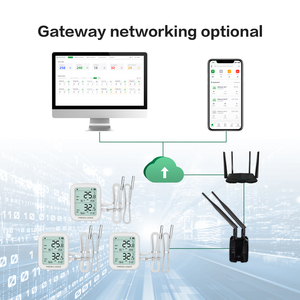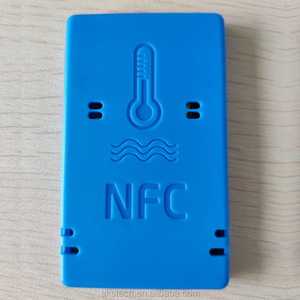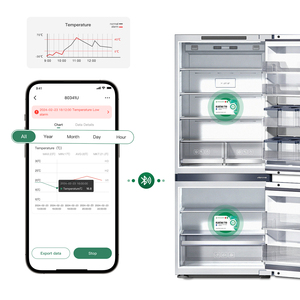(80345 products available)





















































































































































































































A Bluetooth temperature sensor is a device that measures temperature and transmits the data wirelessly using Bluetooth low energy (BLE) technology. These sensors are compact, autonomous, and robust, making them suitable for various applications, such as monitoring high-temperature processes, ensuring cold chain traceability, and regulating the use of air conditioning in buildings. These sensors have a temperature-sensing element that detects changes in environmental temperature and converts these changes into an electrical signal. The signal is then processed and converted into a digital format by the transmitter, which sends the digital data wirelessly to a receiver, such as a computer, smartphone, or dedicated device.
Bluetooth temperature sensors allow for real-time temperature monitoring, enabling quick responses to changes in temperature. These wireless temperature sensors can also measure a wide range of temperatures, making them suitable for various applications, including thermal pest remediation, dry heat decontamination, and humidity monitoring. Some Bluetooth temperature sensors also come with a cloud function, allowing users to check and manage temperature data on their smartphones or computers.
Bluetooth temperature sensors have various applications. For instance, a Bluetooth temperature sensor for the freezer or Bluetooth temperature sensor for the inside cooler can be used to monitor the temperature of perishable goods during transportation and storage, ensuring that they remain within the required temperature range. Similarly, a Bluetooth humidity and temperature sensor can monitor humidity levels in various environments, such as museums, archives, and data centers, to prevent damage to sensitive materials. Bluetooth temperature sensors also come in handy when maintaining a conducive environment for babies and toddlers. The temperature can guide parents on dressing their kids for the night and what to set on the thermostats. Moreover, homeowners who've encountered water damage and mold issues at home can benefit from Bluetooth temperature sensors. The gadgets aid by letting the homeowners know when it's time to ramp up the temperature and control humidity levels to avoid a recurrence of mold growth.
The range of a Bluetooth temperature sensor varies depending on the model and the environment in which it is used. However, the range of Bluetooth 5.0, the standard for most modern Bluetooth temperature sensors, is up to 100 meters (328 feet) with 0 dbm and up to 120 meters (394 feet) with 4 dbm. Other factors that can affect the range of Bluetooth temperature sensors include obstacles, interference, and the presence of water.
Several factors can affect the accuracy of a Bluetooth temperature sensor. For instance, Bluetooth temperature sensors fBBQsBBQ have a specified temperature range within which they can operate accurately. If the temperature goes beyond this range, the sensor's accuracy decreases. Besides, the type of sensor used in the Bluetooth temperature sensor can affect its accuracy. Thermocouple sensors are known for their accuracy and speed, while other temperature sensors, like thermistors and RTDs, have higher accuracy and stability. Additionally, interference from other wireless devices or electromagnetic fields can affect tBluetootemperatusensor'sr'sr’s accuracy.
Browse Alibaba.com to discover a wide range of temperature sensorors types and to buy in bulk.